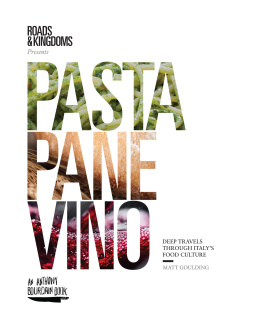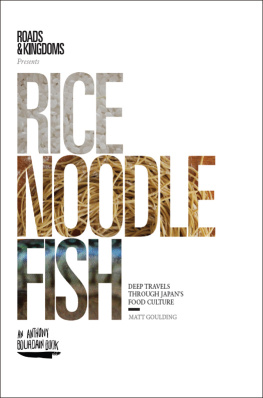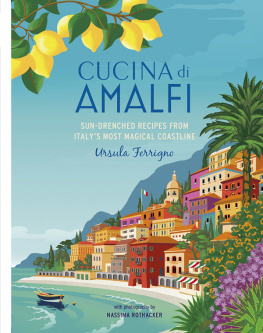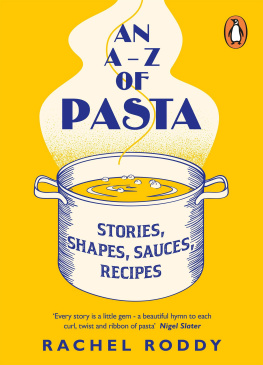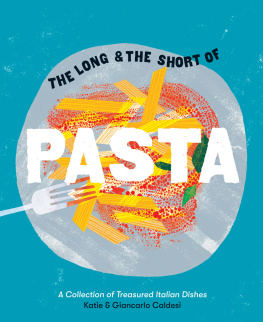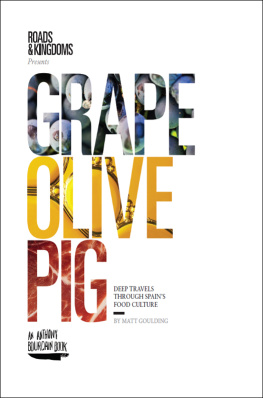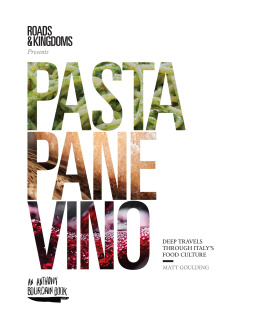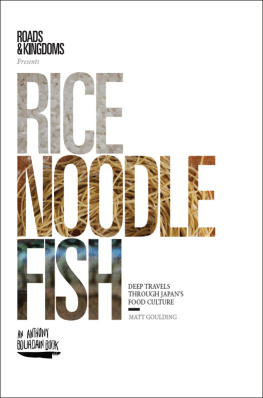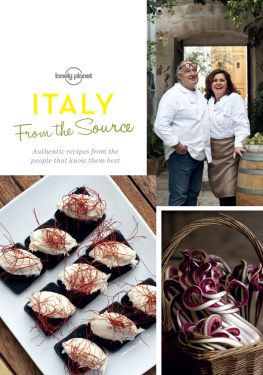RICE, NOODLE, FISH
GRAPE, OLIVE, PIG
For the nonne, who have taught the world so much about eating
Contents
Guide
Contents

Laura Prez
How This Book Was Born
Dear Tony,
Im in a tough spot. Of all the people I know, Im guessing youre the one who will best appreciate my predicament. I write to you from Savigno, just outside Bologna, a town surrounded by sweet pignoletto vines and truffle-studded forests. Today is Easter, a day of liberation for the Italians, and splayed before me are the bones of half a dozen courses: rag streaks, gnawed lamb ribs, pistachio dust. My blood runs with a mix of rendered pork fat and bitter spirits, six months in the underbelly of Italys food world hitting me down to the marrow. But its not my lipid profile I worry about; its the table full of grandmas and couples and new friends around me. Let me explain.
When I first left New York in 2010 in search of a new start, I set my coordinates for Emilia-Romagna. There I would find a hilltop town, not unlike Savigno, powered by egg-rich pastas and slow-simmered sauces and single women with a penchant for lost Americans. Only a stopover in Barcelona and a fateful cerveza with a young Catalan I now call my wife kept me from my al dente destiny.
Granted, my vision was far from original. Most of the world dreams of Italyof the pinup landscape porn, the cumulus clouds of cappuccino foam, the meals that stretch on like radioactive sunsets. It was those same dreams that drove me back here, that have me itching to capture this magic on the page. But lately Ive been having nightmares about Italy. Nightmares about what the Italians will think about another foreigners take on their traditions. Nightmares about getting it wrongabout mistaking Parmesan for pecorino, pancetta for guanciale, spaghettini for spaghettoni. I dont mean nightmares in the figurative sense; I mean nightmares in the cold-sweat-and-sleepless-nights sense.
Nobody takes food more seriously than the Italians. Ive seen family feuds break out over pasta shapes and grape varietals. No doubt youve been caught in the crossfire before. But these arent the petty beefs of food snobsthese cut to the core of what it means to be Italian. More than anywhere else in the world, food carries the full weight of Italys heritage: the pains and joys of its history, the depth of its ingenuity. Politicians are corrupt, democracy is fragile, borders are porous, but la cucina italiana is eternal.
At the end of the day, these are the people I want to surround myself withthe type who wont hesitate to spit in my vino if I ask for Parmesan with my spaghetti alle vongole. But they are also the ones I fear I will inevitably disappoint.
Does the world need another book about Italian food? Am I walking into a trap?
Yours,
Matt
* * *
Dear Matt,
The path you have chosen is indeed fraught with peril. The overwhelming instinct of Italophiles like you and me is to romanticize, oversentimentalize, and generally follow the well-worn tradition of soft-edged food porn when writing about Italy.
What is charming to us is often a frustration and even an affliction to Italians. The same political and cultural paralysis that keeps this beautiful collection of city-states real also traps its citizens in a reality that often approaches the tragically surreal.
But one can be forgiven, I hope, for finding great joy, even epiphany, in a bowl of pasta vongole (though not with cheese) and a bottle of rustic wine, the simple things that seem the birthright of the average Italian.
Careening through Rome late at night in a taxi, half-swacked on Negronis, listening to Mina, remains magic. To lay eyes on a bowl of cacio e pepe, a plate of trippa, agnolotti, urchins in season, porchettathats some powerful shit.
The mysteries of Italian parking, law enforcement, hand gestures, dress, family relationships, superstitions, dialectal differences, slang, and physical contact are unknowable yet enticing in that unknowability.
Im still trying to figure it all out. It sounds like you are, too.
Tony
* * *
Ciao Tony,
I will leave the mysteries of law enforcement and hand gestures to the locals, though Ive been on the receiving end of both throughout my time here.
But I have been trying to solve a few mysteries of the kitchen, namely what makes Italian food so damn delicious. A wise man in Kyoto once told me: Western cuisine is about addition; Japanese cuisine is about subtraction. But I think he overlooked a kinship between Japanese and Italian cookingboth built around exquisite product, both guided by a type of magical math best described as addition by subtraction: 3 - 1 = 4.
And like Japanese cuisine, Italian food is driven by a set of rules and beliefs established over hundreds if not thousands of years, and embraced by a citizenry that largely rejects the notion of people fucking with their food. But Italian cuisine is not a statue in a museum; its not some intractable monument to the past. It lives and breathes and bleeds like any good culture does.
I thought I could come here, eat a ton of tagliatelle, soak my bones in vino, and pay gentle tribute to the traditions of this wondrous place. I thought I would write a book about nonna, but everywhere I turn, I find granddaughters and grandsons writing the next chapter in their family history: three young brothers in Puglia expanding the essence of mozzarella and burrata in a deeply conservative culinary corner of Italy; a father-daughter team in the Piedmont who cast off the yoke of Barolos staid history to produce some of the most poetic and controversial wines in the world; a class of next-generation pizzaioli in Naples wood-firing a path to a new understanding of the planets most popular food.
In the end, its not a book about grandmas and their sacred family recipes (though they have a few delicious cameos); its a book about a wave of cooks, farmers, bakers, shepherds, young and old, trying to negotiate the weight of the past with the possibilities of the future.
I know how you feel about Italian cuisine. I know you dont want some young hotshot turning pasta alla carbonara into performance art. You dont want your cappuccino with condescension. Im with you. But after a few hundred meals here, Im starting to see just how important this chapter is in the story of Italian cuisine, and I think it might make a worthy addition to this little series we have working.
What do you think?
Saluti,
Matt
* * *
Matt,
My response to youand this sort of improvisation, innovation, expansion on traditional Italian regional specialties is entirely emotionalis a blind, unthinking, instinctive hostility. I hate it. I hate the thought. I am a curmudgeon when it comes to all things Italian.
I do not doubt there are delicious new takes on pizza, even that beloved carbonara. It is possible. It is, I guess, only right that new generations of Italian chefs are flexing their creative minds and their skills in the interest of moving things forward.
But I hate the idea in a way that only a non-Italian, newly besotted with an over-romantic view of that country, can be. Italians complain that their country doesnt work, that it is stuck, mired in the corruption and incompetence and antiquated attitudes of another timethat nothing ever changes. Which is exactly what I love in so many ways about the country. That state of paralysis. If it worked, it would change. And I dont want it to change.
I go to a place in Rome every time Im there. And theres another place in Turin. The waiters are the same as they were twenty years ago. The owner who buzzes you into the locked door is the same. The menu is tiny (when there is one) and that never changes, either. Simple. Unpretentious. Handmade pastas, a few simple sauces.

